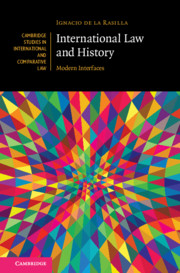Book contents
- International Law and History
- Cambridge Studies in International and Comparative Law: 152
- International Law and History
- Copyright page
- Dedication
- Epigraph
- Contents
- Acknowledgements
- Introduction
- 1 The Turn to the History of International Law
- 2 Contextual Approaches to the History of International Law
- 3 Critical/Postmodern Approaches to the History of International Law
- 4 TWAIL/Post-colonial Approaches to the History of International Law
- 5 Global Approaches to the History of International Law
- 6 Feminist Approaches to the History of International Law
- 7 Normative Approaches to the History of International Law
- 8 Sociological Approaches to the History of International Law
- 9 Institutional Approaches to the History of International Law
- 10 Biographical Approaches to the History of International Law
- 11 Multi-perspectivity and Periodization in the History of International Law
- Bibliography
- Index
- Cambridge Studies in International and Comparative Law
6 - Feminist Approaches to the History of International Law
Published online by Cambridge University Press: 07 January 2021
- International Law and History
- Cambridge Studies in International and Comparative Law: 152
- International Law and History
- Copyright page
- Dedication
- Epigraph
- Contents
- Acknowledgements
- Introduction
- 1 The Turn to the History of International Law
- 2 Contextual Approaches to the History of International Law
- 3 Critical/Postmodern Approaches to the History of International Law
- 4 TWAIL/Post-colonial Approaches to the History of International Law
- 5 Global Approaches to the History of International Law
- 6 Feminist Approaches to the History of International Law
- 7 Normative Approaches to the History of International Law
- 8 Sociological Approaches to the History of International Law
- 9 Institutional Approaches to the History of International Law
- 10 Biographical Approaches to the History of International Law
- 11 Multi-perspectivity and Periodization in the History of International Law
- Bibliography
- Index
- Cambridge Studies in International and Comparative Law
Summary
Feminist or gender-centred approaches to the history of international law can be very broadly identified by their object of historical investigation, namely the study of the impact of international law on the status and treatment of women across different historical periods and regions, the role played by women, both as individuals and as a group, as agents of international legal change, and their intellectual contribution to international legal scholarship over time. They can also be broadly identified by their common animus historiandi. The chief purpose driving a historical investigation into women’s histories in international law is that of redressing the ‘invisibility of women’ in the history of international law. This finds its justification in a primary need to bridge gaps that exist in the historical record of international law so as to make international legal history as complete, inclusive, and accurate as possible. It is also premised on the acknowledgement that, as the historian Gerda Lerner noted, ‘the fact that women were denied knowledge of the existence of women’s history decisively and negatively affected their intellectual development as a group’. The animus historiandi of feminist or gender-centred approaches to the history of international law may also involve contributing to the theoretical exemplification of the purported ‘patriarchal basis’ and ‘male-gendered nature of international law and its doctrines’ in a historical perspective, in particular when the analysis is informed by critical feminist perspectives. This is part of a broader use, according to Christine Chinkin, of ‘feminist theory as a basis for critical analysis, that is to show how the structures, processes, and methodologies of international law marginalize women by failing to take account of their lives or experiences’ today, as they have also largely done throughout history.
- Type
- Chapter
- Information
- International Law and HistoryModern Interfaces, pp. 183 - 219Publisher: Cambridge University PressPrint publication year: 2021



